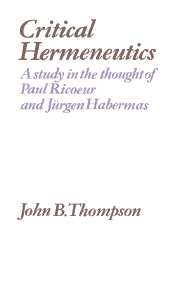Book contents
4 - Problems in the analysis of action
Published online by Cambridge University Press: 10 December 2009
Summary
The previous chapters have shown that the analysis of human action is a theme which is common to the traditions of ordinary language philosophy, hermeneutic phenomenology and critical social theory. Ordinary language philosophers focus on the everyday usage of the words with which actions are described, and Winch in particular elaborates an account of meaningful action which is based on Wittgenstein's later theory. As an exponent of hermeneutic phenomenology, Ricoeur develops a mode of discourse in which action may be treated as a text, so that it may be subsumed under the auspices of a general theory of interpretation. Habermas approaches the problem from the standpoint of critical social theory, proposing an analysis of action which may serve as a basis for the critique of ideology. In this chapter, I should like to begin the critical discussion of these three traditions by assessing the strengths and weaknesses of their contributions to the analysis of action. I shall try to show, first, that ordinary language philosophers do not provide an adequate account of the connection between language and experience, of history and social change, and of meaningful action and social relations. These shortcomings are avoided to some extent by Ricoeur and Habermas, but the writings of the latter authors contain difficulties of their own. Thus, in the second part of the chapter, I argue that Ricoeur does not present a compelling case for his distinction between modes of discourse, nor does he offer a satisfactory defence for his conception of action as a text; and I further maintain that the work of Ricoeur does not yield a coherent account of the relation between action and structure.
- Type
- Chapter
- Information
- Critical HermeneuticsA Study in the Thought of Paul Ricoeur and Jürgen Habermas, pp. 115 - 149Publisher: Cambridge University PressPrint publication year: 1981

